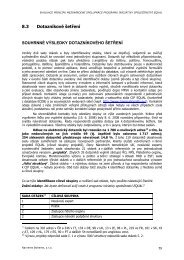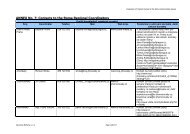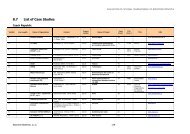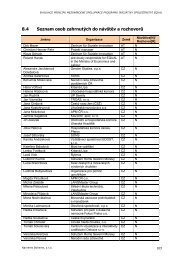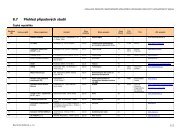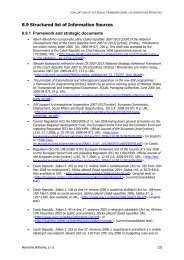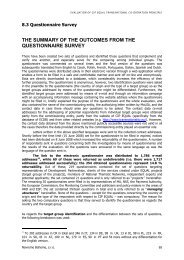EQUAL - Final report - eng - navreme
EQUAL - Final report - eng - navreme
EQUAL - Final report - eng - navreme
You also want an ePaper? Increase the reach of your titles
YUMPU automatically turns print PDFs into web optimized ePapers that Google loves.
EVALUATION OF CIP <strong>EQUAL</strong> TRANSNATIONAL CO-OPERATION PRINCIPLE<br />
On the contrary, the webs of the organisations implementing the projects have been identified as a<br />
relatively reliable source of information. However, also in this case we meet with the risk consisting in<br />
the fact that the organisations may change their web over time so that the information on the project<br />
already implemented will not be available any more (the team met with this situation in several cases<br />
of foreign projects).<br />
In general, it is possible to state that when carrying out the evaluation, it was difficult to obtain<br />
reliable and up-to-date information on the individual projects and in case, when this information was<br />
obtained, it was not sure whether a source always accessible was concerned.<br />
4.2 Questionnaire survey<br />
The link to the electronic questionnaire was sent to 1,786 e-mail addresses 5 while 69 of them<br />
returned as undelivered (i.e. 1,717 addresses were addressed successfully); 254 received<br />
questionnaires represent the response rate 14.8 %. Of this number, 219 questionnaires<br />
contained a set of questions focused on the representatives of the development partnerships, clients<br />
of the services created within the framework of the <strong>EQUAL</strong> projects (the target groups of the<br />
projects), members of the National Thematic Networks, independent experts and potential applicants;<br />
the set contained 21 questions. The remaining 35 questionnaires were filled in by the representatives<br />
of MA, NSS, the Payment Authority, the European Commission, the Monitoring Committee and the<br />
politicians and strategy makers in the area of HRD and the ESF; the set contained thirteen questions<br />
in total. None of the questions – with the exception of the inquiry about the country of the origin and<br />
the respondent type with respect to CIP <strong>EQUAL</strong> – was obligatory. Duplicities were removed from the<br />
obtained set of questionnaires, the questionnaires were deleted, in which less than 20 % of answers<br />
were filled in, and further corrections were carried out, on the basis of which the number of the<br />
answers being analysed reduced further by eight to the resulting 212 questionnaires focused on<br />
particular projects or recipients and 34 questionnaires, which were filled in by the management<br />
structure members, i.e. to 246 in total. A detailed outline of the work with the questionnaires and the<br />
results of the questionnaire investigation are mentioned in Annex 8.3.<br />
The answers from the questionnaires show that the most frequent source of inspiration, assistance<br />
and information for preparation and implementation of the transnational cooperation is the previous<br />
own experience. The experience of the partners from abroad in combination with methodological<br />
instructions of the EC and the assistance of the National Support Structure were mentioned as the<br />
source of inspiration and support. The quality of the particular support provided was high while this<br />
status has not been unchanging, but instead it is indicative of rather positive development of the<br />
relations between NSS and the recipients. To the planning of the project itself a question is related,<br />
what influence the transnational cooperation has on the l<strong>eng</strong>th of the project, respectively if it<br />
requires higher time investment. The original hypothesis was confirmed that there existed a certain<br />
influence for sure, however, it should not be extreme - the respondents most frequently concurred<br />
that the transnational cooperation extended the project by one fifth of its l<strong>eng</strong>th. When answering the<br />
question, which stages of the transnational project require more time, the respondents mentioned<br />
most frequently the very stage of preparation and then the overall coordination of the transnational<br />
co-operation. If the respondents of the questionnaire investigation mentioned that the teams<br />
implementing the transnational partnership needed support, than it was above all in the area of<br />
search for partners.<br />
According to the respondents, transfer of experience and practices, organising seminars, conferences<br />
and various other meetings belonged to most frequently implemented activities within the framework<br />
of the transnational cooperation. These findings were combined with the results of the inquiry for<br />
suitability of the individual activities for the transnational cooperation, to be specific, with the answers<br />
to the question: “Which activities are, in your opinion, the most suitable for the transnational<br />
cooperation?” with the selection possibility on the scale from 1 (not at all) to 6 (a lot). It is obvious<br />
5 In total on 302 addresses in CZ and 346 in IT, 134 in DE, 98 in UK, 13 in IE, 98 in PL, 219 in FR, 101<br />
in SK, 43 in AT, 109 in NL, 179 in ES, 90 in PT and other 54 in undistinguished way for the English<br />
version.<br />
Navreme Boheme, s.r.o. 27



